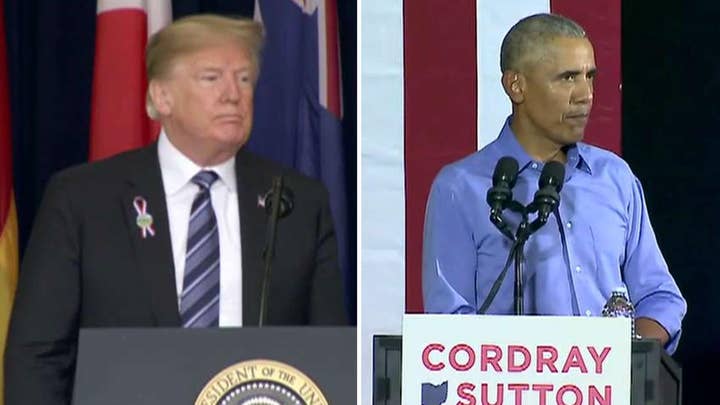
The Ohio governor's race between Democrat Richard Cordray, left, and Republican Mike DeWine, right, is tight with just weeks until the midterms. (Cordray/DeWine campaigns)
Ohio’s economy is strong after eight years of Republican rule in a state that went decisively for the GOP two years ago, while the Democratic candidate for governor faces a new dust-up over unusual ties to a politically connected ad firm.
Still, the governor’s race in Ohio between Republican Mike DeWine and Democrat Richard Cordray is tight in what has historically been one of the hottest presidential battlegrounds in the country – going twice for George W. Bush, twice for Barack Obama and decisively for Donald Trump.
Though polling hasn’t happened since June, the Real Clear Politics average gives Cordray, the former director of the controversial Consumer Financial Protection Bureau, a 1.6 percent advantage over DeWine, the state attorney general and former U.S. senator.
Fox News Power Rankings and Inside Elections give DeWine a slight edge, while the Cook Political Report and Sabato’s Crystal Ball call the contest a toss-up.
The race is a rematch from the 2010 attorney general’s race, in which DeWine defeated the incumbent Cordray.
Obama even stumped last Thursday in Cleveland for the man he appointed to run the CFPB.
“Rich was one of the first people to ever endorse my candidacy for president,” Obama said of Cordray. “He had my back when some of you probably couldn't even pronounce my name, and if you elect him, you'll have a governor who will have your back every single day.”
On the same night, Donald Trump Jr. was the featured speaker at a private fundraiser for DeWine in Salem, Ohio.
Cordray tapped former U.S. Rep. Betty Sutton to be his lieutenant governor if victorious, while the Ohio Secretary of State Jon Husted is running for the number two spot under DeWine.
Husted said he’s not surprised the race is close, but believes voters realize how Ohio has changed since the days of Democratic Gov. Ted Strickland, who served when Cordray was the state’s attorney general and treasurer.
“Open seats in Ohio are always competitive, but a majority of Ohioans feel we are headed in the right direction,” Husted told Fox News. “Unemployment is almost at record lows … Under Cordray-Strickland, employers were laying people off. Now employers have so many jobs, they can’t find enough people to fill them.”
However, the state’s GOP faces a rift between Trump and two-term Gov. John Kasich that never quite healed after the 2016 Republican presidential primary.
“We try to earn the support of everyone and welcome the support of both the president and the governor,” Husted added. “Electing Mike DeWine as governor is one of the few things the president and the governor agree on.”
The Trump-Kasich divide doesn’t help the GOP, which needs a unified party in a competitive race, said Nathaniel Swigger, a political science professor at Ohio State University.
“Kasich is still relatively popular with independents but they can’t talk about him,” Swigger told Fox News. “If they try to mobilize the Trump voters, they risk demobilizing Kasich voters. If they try to mobilize the Kasich voters, they risk demobilizing the Trump voters.”
DeWine looks to cap off his resume after serving in the state legislature, representing the state in the U.S. House, serving as lieutenant governor and then two terms in the U.S. Senate. He lost to Democrat Sherrod Brown during the 2006 Democratic wave.
Cordray was elected as state treasurer in 2006, then won a special election in 2008 to become the state attorney general. He lost to DeWine in 2010. Obama named him to head the CFPB in 2012, where he served until late 2017.
Although Republicans are suspicious of the consumer bureau because of its expansive power, Cordray has sought to use the issue to his advantage.
"This week 10 years ago, a financial crisis crushed Ohioans who lost jobs and homes," Cordray tweeted Tuesday. "My opponent’s votes let Wall Street run wild and take advantage of people on Main Street. Now he blames me! I went to work and cleaned up the mess he and his allies made."
Hours before the Obama rally Thursday, the Associated Press reported Cordray’s gubernatorial campaign hired the Washington-based GMMB advertising company—the same firm the CFPB contracted with under Cordray.
The consumer bureau’s inspector general found in June the contract from August 2013 to February 2018 was estimated to cost taxpayers $11 million and ballooned to $43.8 million because of poor management.
Ohio Republicans alleged cronyism for a company that was also the lead ad agency for both of Obama’s presidential campaigns. The Cordray campaign responded there was nothing improper about the firm’s work for either the CFPB or the campaign.
"Rich Cordray is proud of the work he did at the CFPB to take on predatory lenders and put $12 billion back into the pockets of 30 million Americans who had been cheated or mistreated," Cordray spokesman Mike Gwin told the Associated Press. "It's unsurprising that those same powerful interests are now using bogus and debunked smears to try to misrepresent Rich's record of standing up for middle class families."
Still, Swigger of Ohio State University doubts the average voter is too concerned with the CFPB.
“There is no data on how voters feel about the CFPB. It’s a little inside baseball,” Swigger said. “I would be surprised if a majority of Ohio voters even know what Richard Cordray’s last job was.”
Fred Lucas is the White House correspondent for the Daily Signal.






